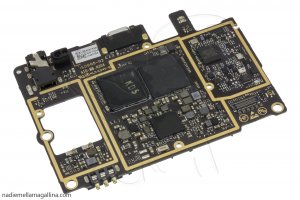Dimensions : 76.2 x 152.6 x 7.99 mm
Weight : 150 g
SoC : MediaTek MT6752
Processor : ARM Cortex-453, 1700 MHz, Number of cores: 8
Graphics processor : ARM Mali-T760 MP2, 700 MHz, Number of cores: 2
RAM memory : 2 GB, 800 MHz
Internal memory : 16 GB
Memory cards : microSD, microSDHC, microSDXC
Display : 5.5 in, IPS, 1080 x 1920 pixels, 24 bit
Battery : 3000 mAh, Li-Polymer (polymer lithium ion)
Operating system: Android 5.0 Lollipop
Camera : 4160 x 3120 pixels, 1920 x 1080 pixels, 30 fps
SIM card : Micro-SIM
Wi-Fi : a, b, g, n, Wi-Fi Hotspot, Wi-Fi Direct
USB : 2.0, Micro USB
Bluetooth : 4.1
Location / Navigation : GPS, A-GPS, GLONASS
